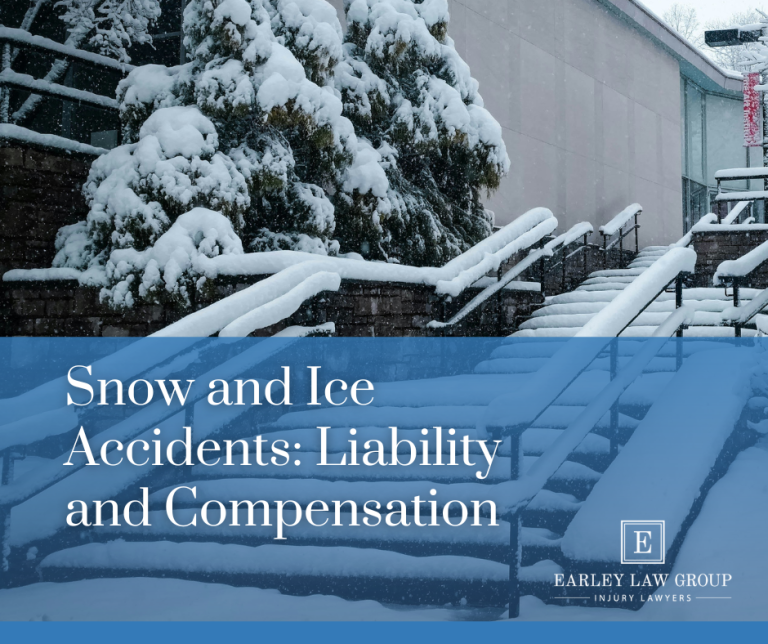
Winter in Massachusetts brings bitterly cold temperatures and the potential hazards of ice and snow accumulation. Slip and fall accidents are common during this season, and understanding liability is crucial for those who may be injured.
In this article, we will explore who is responsible for these accidents, the damages one may recover, the role of property owners, and the changes in the law that affect slip and fall claims on snow and ice.
Liability for Slip and Fall Accidents on Snow and Ice
During winter, sidewalks, parking lots, and residential areas become prone to slip-and-fall accidents due to icy and snowy conditions. Property owners have a duty to exercise reasonable care, regularly inspect their property, and promptly remove or address ice and snow. Failure to meet this duty can lead to negligence, making property owners liable for injuries sustained on their premises. This responsibility extends to businesses hiring third-party services for snow and ice removal.
Shoveling and De-Icing Is the Property Owner’s Responsibility:
Property owners are responsible for maintaining safe conditions on their premises, including addressing icy sidewalks promptly. If you slip on someone else’s property, you may be entitled to compensation for physical harm, emotional anguish, and financial distress. It’s crucial to understand the damages you can recover, including non-economic damages (pain and suffering, disability, loss of consortium) and economic damages (loss of income, medical expenses).
Slip and Falls on Snow and Ice:
Slip and fall accidents resulting from untreated snow and ice accumulation can cause long-lasting injuries. Property owners must ensure safe walking surfaces for guests, customers, and employees. Preventative measures, such as prompt snow removal, salting, and proper lighting, can reduce the risk of accidents. It’s important to distinguish between natural and unnatural accumulations, as property owners are liable for preventable hazards.
Slip and Fall Claims and the Law on Snow and Ice:
The landmark case of Papadopoulos v. Target Corporation in Massachusetts significantly impacted the liability for snow and ice-related accidents. The court abolished the “natural accumulation” rule, holding property owners accountable for hazardous conditions regardless of the source of ice and snow. Property owners are now required to keep their premises clean and safe, and those injured by falls on snow and ice can seek compensation more quickly.
After a Winter Slip and Fall: Your Next Steps
Experiencing a slip and fall on snow or ice can be jarring, but taking the right steps afterward is crucial. Here’s a straightforward guide on what to do:
- Prioritize Your Safety: Ensure you are in a safe location away from further hazards. If possible, check yourself for injuries and seek medical attention if needed.
- Document the Scene: Take photos of the accident scene, including the icy or snowy conditions. Note any potential contributing factors, such as lack of salt, lighting, or signage.
- Seek Witnesses: If there were witnesses to your fall, gather their contact information. Their accounts may be valuable when establishing the circumstances of the incident.
- Report the Incident: Inform the property owner or manager about the accident. Ensure that they document the incident in their records.
- Medical Attention: Even if injuries seem minor initially, consult a healthcare professional. Some injuries may manifest later; a medical record can be crucial for your claim.
- Keep Records: Maintain records of all medical treatments, expenses, and any impacts on your daily life. This documentation strengthens your case when seeking compensation.
- Legal Consultation: Reach out to a personal injury attorney for a free consultation. They can help you understand your rights, evaluate the potential for a claim, and guide you through the legal process.
Remember, you’re not alone in this. Taking these steps can contribute to a smoother process if you decide to pursue a claim for the injuries and hardships caused by the slip and fall. Earley Law Group Injury Lawyers is here to help if you have questions or need guidance.
Call us today for a free consultation at (617) 338-7400. Your well-being matters, and we’re ready to advocate for the compensation you deserve.
Conclusion
Liability for slip-and-fall accidents on snow and ice is crucial, especially during the unforgiving winter months in Massachusetts. Property owners are responsible for ensuring their premises are safe, promptly addressing snow and ice accumulation, and taking necessary precautions to prevent accidents.
Understanding the types of claims available is essential for those who have suffered personal injuries, such as bodily harm, emotional distress, or financial strain resulting from medical expenses.
As highlighted by the Papadopoulos case, the changes in the law emphasize the importance of property owners consistently maintaining safe conditions, irrespective of the origin of ice and snow.
If you or a loved one has experienced a slip and fall incident during winter, seeking compensation for damages is a viable option. It’s crucial to comprehend the various types of claims, including personal injury, that may cover various losses, from medical expenses to the impact on your daily life.
At Earley Law Group Injury Lawyers, we understand the challenges you may face after such an incident. Our team is here to provide a free consultation, guiding you through understanding your rights and potential claims after a bodily injury. Don’t hesitate to reach out; we’re here to help you navigate the path to recovery and compensation.
Remember, your well-being matters; you don’t have to face this journey alone.
Call us today for a free consultation, and let Earley Law Group Injury Lawyers be your advocate in seeking the compensation you deserve.
 Call Earley Before It’s Too Late!
Call Earley Before It’s Too Late!